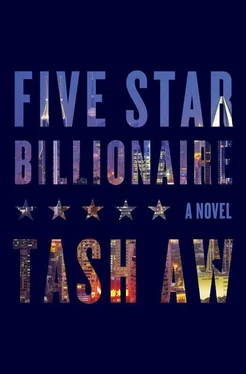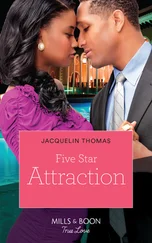“I am so sorry to be late. Like everyone else, I blame the traffic. Will you please forgive me?”
“Traffic is a part of life in Shanghai. Anyway, compared to Beijing, it’s nothing. Please don’t worry. You’re not really late at all.”
The maître d’hôtel eased Walter Chao’s chair into place as he sat down. “That’s very understanding of you. I can’t abide tardiness myself.” He opened the menu briefly and then closed it, pushing it to one side. He was not a tall man, Yinghui had noticed — about the same height as she was, maybe five feet five or six — and yet, once seated, he had a way of dominating the space at the table in the subtlest way, his forearms resting on the edge of the table, his head leaning just the tiniest bit across toward her, as if anticipating greater intimacy.
A waiter appeared with an ice bucket on a stand. He briefly showed the label to Walter Chao, who nodded without really looking, without really taking his eyes off Yinghui. He could not be considered handsome in any conventional sense, yet Yinghui felt the same sense of embarrassment as when, as a schoolgirl, she had spoken to the cool, good-looking boys in her neighborhood — a sense of timidity mixed with excitement. That feeling was entirely foreign to her now, belonging as it did to another era in her life.
She averted her gaze and looked at the champagne — a bulbous bottle with an unfamiliar label, not a high-fashion name favored by gangster rappers and trashy heiresses but something with everlasting chic.
“Pink champagne,” she said. “I haven’t had that in years.”
“I like the idea of starting each new venture with a celebration,” he said, “rather than waiting for the end. That way I can look forward to a successful venture. I don’t understand people who only celebrate a successful affair at its conclusion. But, please, do say if you don’t like it. We can always order a different one. Or just orange juice if you’re not up for champagne tonight.”
“Oh, no,” Yinghui said, lifting her flute, “I am always up for champagne.”
“Glad to hear that,” he said, lifting his flute to match hers, “because I have a feeling we’re going to get on very well together. Ever since I heard about you and read those articles in the business news, I thought, Now, there’s someone formidable. Cheers.”
The night sky was heavy with a dusky purple glow, the lights of the city blotting out the darkness. She was glad she had arrived early, that she had had a chance to settle in and stake out her position at the table. She felt him watching her, and even though he did so discreetly, she knew that she was being judged.
“What are you going to eat?” she said. “The great thing about arriving early is that I was able to decide what to eat before you got here.”
“Great,” he said. “I always take the same thing here. But I’m not going to tell you what I’m having, because I don’t want to influence your decision.”
He brushed an invisible speck of dust off his lapel, and she noticed the quality of the fabric of his jacket: smooth, matte, unblemished. As he inclined his head for an instant, she saw that his nose was uneven, curving to one side just at its tip; for the rest of the evening she would notice this tiny imbalance from time to time and be struck by how it made his face look damaged, in spite of his perfect grooming.
“I have an idea,” he said. “Why don’t we talk business for just a few minutes before we order our food? That way we can get it out of the way and enjoy ourselves — chat about life, find out more about each other, all the things that normal people do when they first meet. What do you think?”
“I think it’s an excellent idea. But let’s get it done quickly, because I’m starving. And curious too.”
When he laughed, his face creased into deep lines, aging him. She had thought of him as around her age, but now she could see that he was quite a few years older, his skin weathered by the sun (she could imagine him on holiday on the French Riviera or Pansea Beach in Phuket, a compact, dark man dressed in Bermuda shorts and an ironed short-sleeved shirt). “I take it you’ve Googled me, so there’s no need to go into my background.”
“Not really,” she lied (she had spent a frustrating and ultimately fruitless hour on the Internet trying to piece together a picture of this man, then rung contacts in various countries in Southeast Asia to see if anyone knew him). “But I have a rough idea of your work. Very impressive. Of course, I’d known about you vaguely in the past, especially the projects in Malaysia. I just didn’t make the connection, that’s all — I mean, I didn’t know you were the person who’d done all of them.” She sipped her champagne and looked him in the eye. “But I was always aware of your name,” she lied again.
He shrugged. “Reputation is not important to me. The past is the past — what’s important is what one does next.”
“I quite agree.” She pushed a small bowl of olives toward him. “So, what is one going to do next?”
“That depends on how the rest of this dinner goes.”
“I see.”
He took his napkin and unfolded it over his lap. “Let me ask you a question: When you’re working on a project — late at night, at the end of another sixteen-hour day, when you’re utterly exhausted and wondering why the hell you’re doing it — what goes through your head? I mean, what drives you? What are you hoping to gain by working day in, day out, being nice to people you don’t much like, poring over accounts, talking to boring bankers and accountants. What is it you’re searching for? Is it money?”
“No. Well, yes. No one ever works to become poor,” Yinghui answered. “But obviously it’s not just about money.”
“What is it about, then?”
“I don’t really know.”
“I’ll tell you: It’s about respect. Money is the conduit for respect. The richer you are, the more respect you gain.”
Yinghui shrugged. “I don’t know if it’s that simple.”
He smiled. “You know it is. So let me tell you how I am going to help you gain plenty of respect. Great, massive piles of it.”
HOW TO INVEST WISELY— A CASE STUDY IN PROPERTY MANAGEMENT

As I’ve said on many an occasion, the best way to sharpen one’s business acumen is to analyze real-life situations. Consider the following example, paying close attention to the triumphs and errors of human judgment:
In 1981, my father bought a near-derelict building in Kota Bharu for thirty thousand ringgit . City dwellers would scoff at that price, for it was not a lot of money even in those days. But back then it represented all of my father’s meager savings, plus a considerable amount of money borrowed from well-intentioned friends and relatives who believed that my father was going to make good this time and repay their loans with interest; they thought they were making an investment rather than lending money. I was the only one who was not convinced. Even though this was some time before the gambling properly took hold of him, I could see that his reckless fantasies were already becoming an addiction and that no good would come out of this venture. It would be a failure like everything else he ever did; there would be no glorious curtain call. My time away from him had enabled me to see this as clearly as sunshine after a night’s rain.
I received a letter from him, telling me to take the first bus north to join him at his new home — our new home. I had been living, if you recall, with my aunt in the far south of Johor and had recently gotten a place at a technical college, where I was learning to be an electrician, much to the joy of my aunt. That was the extent of her ambitions for me (people of my background, I remind you, were not primed for greatness). My father’s note was brief but breezy in tone. I looked at the address of the building that had become both his home and new business venture, the enterprise that would reunite us at last and provide us with a solid income sufficient to last him through his final years and — who knows — a legacy I could inherit. The name of the building looked at once bizarre and familiar, and it took me a while to place it.
Читать дальше
Конец ознакомительного отрывка
Купить книгу



![Scott O’Hara - Five-Star Fugitive [= Border Town Girl]](/books/432138/scott-o-hara-five-thumb.webp)









